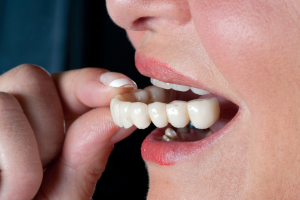The Best Ways To Keep Your Dentures Clean

Looking after your dentures is just as important as looking after your teeth. After all, they can still fall prey to bacteria and plaque build-up, and introduce those things into your mouth. Your gums can also be affected by these risks, which could lead to problems down the line. So, today, our Lancaster dentists will talk about ways to care for your dentures and keep you smiling.
How should I clean my dentures?
Your dentures will need thorough and effective cleaning to stay looking their best and ensure you keep any bacteria and plaque at bay. This involves a few steps:
– Rinsing and removing after meals
– Brushing your dentures every day
– Soaking your dentures at night-time
– Cleaning your mouth after removing dentures
How do I rinse my dentures?
Tap water is fine for a quick rinse, and it helps to dislodge any food, bacteria and particles that might have collected over the day (or meal). Ensure you place your dentures in a case, cup or on a towel when removing them, as they’re fragile.
How do I brush my dentures?
You can use a soft toothbrush and denture cleanser to tackle any deposits. Don’t forget to clean the grooves that sit against your gums while you’re wearing them – adhesive can build up on these.
How do I soak my dentures?
Follow the instructions on the packet of denture solution, or talk to our Lancaster dentists for more advice. If dentures aren’t kept moist, they can lose their shape and become uncomfortable and ineffective to wear. It goes without saying, but ensure they’re thoroughly rinsed of solution before wearing them again. Some chemicals are harmful and can lead to burns, pain, irritation and sickness if ingested.
How do I clean my mouth?
A soft toothbrush can clean your cheeks, tongue and palate. You should take care to remove any denture adhesive too.
What should I avoid?
Don’t use abrasive products, toothpastes, bleaching agents and hot water.
What if my dentures become loose?
That’s what our Lancaster dentists are there for. Regular check-ups can prevent the issue from occurring. If you have loose dentures, you might develop irritation, sores and even infection, so it’s important to schedule a check-up if you’re concerned.
What should I do next?
If you haven’t seen yours recently, book in with our Lancaster dentists. We’d love to help you with all things oral health – including those dentures!





